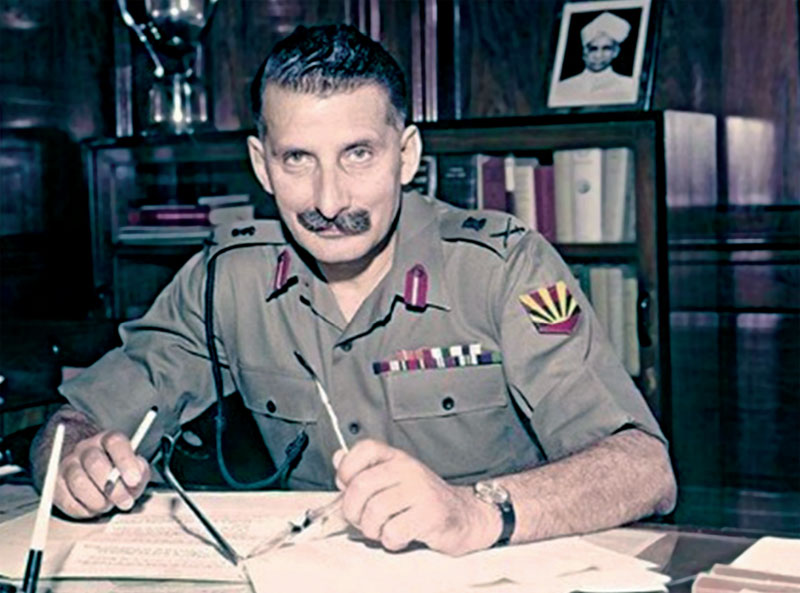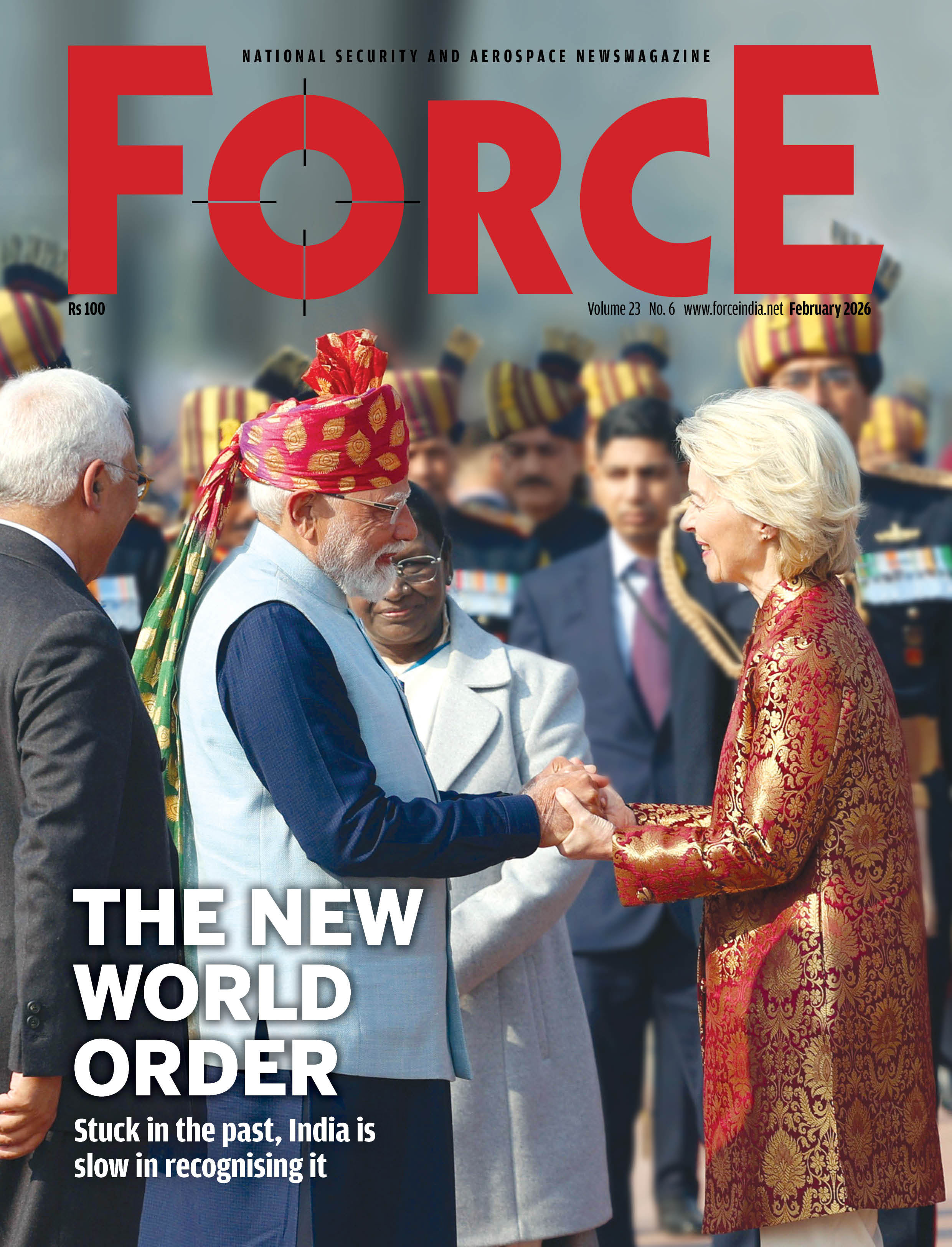Sam Manekshaw
 Brig. Ravi Palsokar (retd)
Brig. Ravi Palsokar (retd)
Field Marshal S.H.F.J. Manekshaw, undoubtedly independent India’s most successful general, has been eulogised and reams written on him. A biopic to cash in on the nostalgia was also made. His was a larger-than-life personality: flamboyant, supremely confident and successful. Everyone was charmed by him and rightly so. However, it would not be wrong to look behind the public persona and see what made Sam the man he was. The individual behind the public face was even more a man of substance, possessing moral character and values beyond reproach, which are worth recounting and emulating. It is a facet which has never received the spotlight it deserved, more so because the general chose for it to be so.
In a life lived so much and so far under the public gaze, one can recount many incidents. However, I have chosen a few which are less spoken about for a variety of reasons. The incidents chosen occurred in Sam’s service: one, when he was the Commandant of the Defence Services Staff College (DSSC), Wellington, as a Major General when his career came under a cloud because of motivated instigation of the defence minister, V.K. Krishna Menon and the yes man of the Indian Army, Lt. Gen. B.M. Kaul, then Chief of General Staff (today’s vice chief), and later to gain infamy as the failed commander of 4 Corps, which was routed by the Chinese in North-East Frontier Agency (NEFA) in 1962. The second set of incidents relate to the period before the Bangladesh war broke out and last, in greater detail, some incidents of his handling of indiscipline that was being swept under the carpet—the reprehensible actions of some of his (successful) field commanders who had not upheld the high standards of moral probity that are expected of the Indian Army.
The basis of this searching look is first, a detailed interview Sam gave to the author of the Staff College history which was being written by my late father, Col. R.D. Palsokar, MC and which I had to reduce in writing to assist him for his research material. The second was a lecture given by the Field Marshal himself in 1992 to the Higher Command Course at the College of Combat, Mhow which I was privileged to attend.
Staff College Inquiry
Maj. Gen. Sam Manekshaw was the Commandant of the Staff College from October 1959 to November 1962 and thereby hangs a tale. The incident started in late 1961 or early 1962 when Lt. Gen. B.M. Kaul had come to give an obligatory lecture. Kaul was considered a favoured man in the army, armed as he was with the confidence of the prime minister Jawaharlal Nehru and the defence minister Krishna Menon. Gen. Kaul was extremely unpopular within the army, not least because he had no battlefield command experience during World War II, and was from the Army Service Corps.

He also had a knack of making himself popular with politicians. In Sam’s telling, the visit was not to Kaul’s liking, and he felt that Sam was far too westernised and inclined to lean toward the United States. This was the period of the Cold War, and India, though non-aligned, was more in favour of the Soviet bloc. How did this result in a court of inquiry against the Commandant? A trumped-up complaint was engineered against him by a member of the Directing Staff which reached Krishna Menon, courtesy Lt. Gen. Kaul and an inquiry was ordered. Sam was at the time approved to be a Lt. Gen. and was awaiting orders for posting and promotion. Everything came to a halt as the inquiry commenced and the presiding officer was GOC in C, Western Command, Lt. Gen. Daulat Singh, a man of impeccable integrity.
The inquiry wound its way and found the complaint to be baseless and exonerated Sam. It was submitted to the Army Chief, Gen. P.N. Thapar who had taken over in May 1961. Aware of the political implications, the chief forwarded the inquiry report and its findings to the ministry of defence (MoD), in effect to Krishna Menon. It finally landed on the table of the prime minister, where it went into a pending tray with nothing decided. The only loser in these sorry proceedings was Sam. It was buck passing of the highest order. Even as this was going on, Sam remained responsible for training the brightest officers of the three services. As he narrated it, he could neither let his students down nor could he let his worries interfere with their training. He could not share his concerns with anyone. The one person who stood by him, as he told the interviewer, was his wife. She told him not to be overconcerned or buckle down to any pressure; they could, she said make a life outside the army if the need arose.
Fate intervened. The 1962 war took place, and the unprepared army suffered its most ignominious defeat at the hands of the Chinese. Suddenly, Lt. Gen. Kaul fell out of favour and the whole country wanted Krishna Menon to resign. Pandit Nehru had no choice but to let his favourite minister and favoured general go. It was time for change.
Around this time Sam had occasion to visit Delhi for some work and met Lt Gen. Daulat Singh, who in addition to his duties was officiating for the former CGS (now disgraced Lt. Gen. B.M. Kaul). Sam accosted him and asked what had happened to the inquiry against him. Lt. Gen. Daulat, an upright soldier, replied that as far as he was concerned, nothing had been found against Sam and the inquiry was pending with the chief. He added that Sam could ask the chief himself why the inquiry was pending. Sam did exactly that. The chief, already under pressure with an inglorious defeat on his watch, told Sam that it was with the prime minister, and he had nothing further to do with it. He added, Sam could ask the prime minister himself if he so desired.
Apparently, the two offices were next to each other and Sam walked across and sought to see the prime minister. Obviously, protocols those days were not what they are now, and Sam shortly found himself in front of the prime minister and explained his side. Nehru, a generous and a fair man, enquired of his secretary who corroborated what Sam had said. A modern reader would do well to remember that in the then protocol, the army and its generals had much respect within the civilian administration which was still very colonial. Prime Minister Nehru realised that injustice had been done to the general officer in front of him and liked what he saw. He said to Sam, ‘I like your spirit. I have a corps in the northeast which needs a commander. Will you go and take over’, (or words to that effect). When Sam readily agreed, the prime minister asked when he could leave. Sam’s character came to the fore, ‘As soon as I leave this office.’ Nehru smiled and told him that orders would have to be issued and that he should go back to the chief, even as he picked up the phone to tell the chief.
The next morning found Sam winging his way to take over 4 Corps in Tezpur. On arrival, Sam issued his first and only order. ‘There will be no withdrawal, the Corps will stand and fight wherever they were’. He added, ‘There would be no further orders.’ He then set about restoring a demoralised corps to make it fighting fit. The rest is history.
Prelude to the War
From 4 Corps, Sam was later posted as General Officer Commanding in Chief (GOC-in-C), Western Command and a little later shifted to command Eastern Command. He took over as chief on 8 June 1969, with his greatest test yet to come. The crisis he faced, and which made his reputation was the Bangladesh War.
The events leading to the Pakistani crackdown and subsequent repression in its then Eastern Wing in March 1971 and the events that followed are well known. The government led by Prime Minister Indira Gandhi wanted an armed intervention immediately and Sam’s resistance to precipitate action is also well known. What is not known, however, is how the three services prepared themselves for the inevitable war. Since this article is specifically about Sam Manekshaw, it is restricted to his part and does not mean to ignore the other services.
In Sam’s narration, at the end of the cabinet meeting with Indira Gandhi, he returned to his office and sent for his Director Military Operations (DMO), Maj. Gen. Inder Singh Gill, and the Master General of Ordnance (MGO). Echoing British prime minister Winston Churchill’s words, he told them, ‘Pray let me have on half sheet of notepaper by tomorrow morning what we need to go to war with Pakistan by the month of November’. I am not aware of what the MGO did, but Gen. Gill’s subsequent actions are instructive. He returned to his office and gave strict instructions that he was not to be disturbed on any account and locked himself in. He asked for no papers, no files and no briefings, relying entirely on his understanding of the problem. By about 8 p.m., he opened his door, called for the duty officer and handed him a sealed envelope written in his hand with instructions that it be delivered immediately to the staff officer of the chief and went home for the night. This just shows the calibre of Sam’s chief operations officer. What action was subsequently taken proved itself in the coming war.
Preparations for war began in earnest, with no matter too small for the chief’s attention. Once again, his character was tested. Two incidents will illustrate. Among his many duties, he had to go to Russia to meet the defence minister to seek some modern armaments. As they sat across the table, the Russian minister pushed across an envelope saying that it was a small gift from the Soviet Union to enable him to enjoy his trip to Moscow. Sam says he went red in the face and replied that he thanked the minister for his kindness but that his own government gave him enough for his needs. He thanked the minister once again as he walked away with concealed fury!
The second incident occurred during a visit to an East European country while Gen. and Mrs Manekshaw were dining in the hotel restaurant. A gentleman sitting at a nearby table sent across his card requesting to speak to Sam. The thrust of his conversation was that he was aware why the Indian Army Chief was in town and what he had sought from the guest government. He could, in effect, arrange the same deal at a much lower cost, which would be mutually advantageous to both. Sam said he tried his best to be civil and turned down the dubious suggestion. Subsequently, he was more circumspect in meeting unsolicited visitors.
Preparation for war also involved training, equipping and bringing the fighting formations to their peak. Sam visited all his major formations and ensured everyone knew what was expected of them. Certain commanders had to be replaced, right men put in right jobs and so on. All this was done in a planned manner so that nothing was left for the last minute. It needs to be emphasised that the other two service chiefs did the same.
The war began with border engagements which reached their peak in the month of November. When the war began in December, the three services were ready. The army’s operations are well known as also those of the Indian Navy and the Indian Air Force. Each service excelled itself, and their achievements as well as those of their chiefs and their military qualities requires a different chronicle. The aim of this article is to focus on Sam’s leadership and particularly his conduct after the war concluded and thereby bring out the sterling character qualities of the man.
Post Victory
Once the war was over and the Pakistani surrender had taken place, Sam recalled that he started getting reports that some of his most successful generals were not showing the standards of moral probity that were expected of them. Sam was quick to realise its effect on army discipline. Characteristically, he chose to deal with the matter in his own way. In any case, he was due to visit his victorious army and chose to deal with transgressions. This is that story.
The victory in Bangladesh and the surrender of the Pakistan Army was unprecedented. Sam’s arrival in Dhaka after the victory was eagerly awaited. On landing, however, the army commander found the chief in a stern mood. His opening remarks alluded to what he called, ‘stealing’ (war booty) by senior commanders and the fact that the most successful field general was ensconced in the Hilton with a local woman. His orders were peremptory. He produced a list of senior officers whom he wanted removed and back in Delhi before he returned the next day. He also directed that they would not be denied the decorations and honours they deserved but they would not be tolerated in command any further.
The newly formed government and its people were grateful to the Indian armed forces. In a grand gesture, the government of Bangladesh had presented a brand-new Mercedes car to the army commander, Lt. Gen. Jagjit Singh Arora. Sam refused to travel in ‘the Mercedes’ and wanted to do so in an Indian Army vehicle. It so happened that the only vehicle available was the pilot jeep, and the chief was driven by the army commander to (where else, but the Hilton) the headquarters. On the outside, the chief was all bonhomie but within the staff a sense of unease prevailed. Sam wanted to set an example. The day wore on and, in the evening, a grand dinner had been arranged, ensuring only Indian Army mess staff was used. However, those not involved were unfazed. One such was Maj. Gen. J.F.R. Jacob, who as chief of staff of Eastern Command had flown in ahead, drawn up the surrender document and organised the ceremony and set in motion the disposal of prisoners of war to camps in India.
Jacob was a bachelor and knew his chief very well. He invited Sam, prior to the dinner, to his room for a drink. As he entered, Sam recalled, there was no one in the room except Jacob and a bottle of Scotch whisky with glasses on a table. ‘Stolen, I presume, like everything else!’, Sam growled. Jacob went one better, ‘I knew you would say that,’ he replied. ‘Here is the bill’, Sam narrated with a twinkle in his eyes.
That was Sam for you, a general sans pareil, a man of honour, humane enough not to be above self-deprecatory attitude and humour.
R.I.P. Sam Bahadur, you will never be forgotten!
Subscribe To Force
Fuel Fearless Journalism with Your Yearly Subscription
SUBSCRIBE NOW
We don’t tell you how to do your job…
But we put the environment in which you do your job in perspective, so that when you step out you do so with the complete picture.








 VIDEO
VIDEO